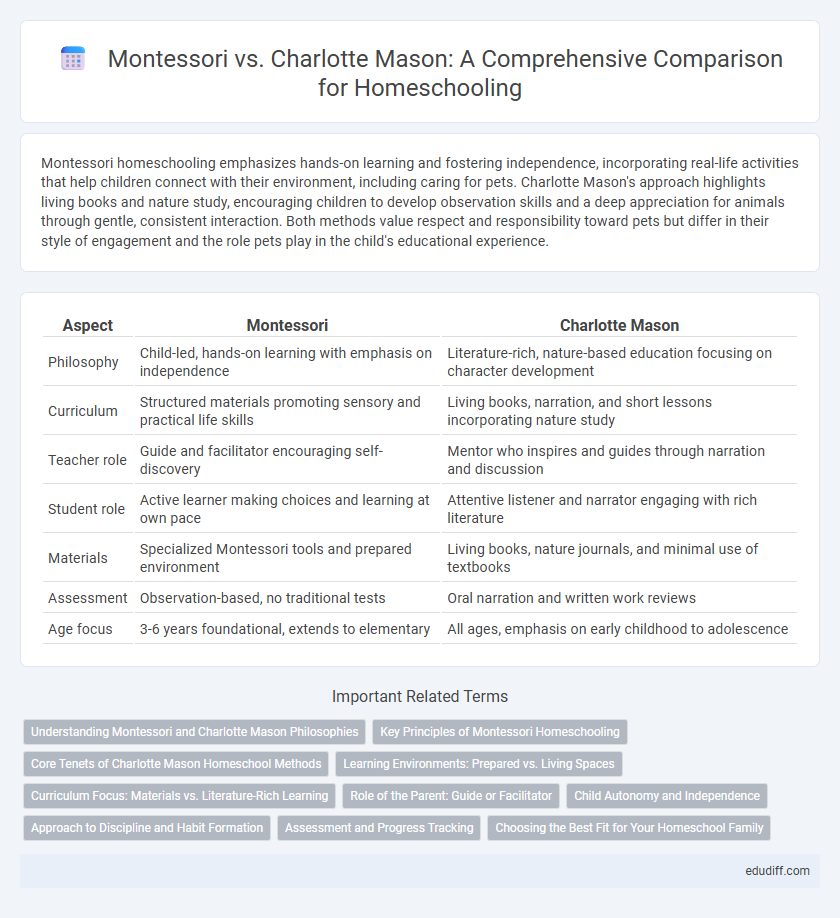Montessori homeschooling emphasizes hands-on learning and fostering independence, incorporating real-life activities that help children connect with their environment, including caring for pets. Charlotte Mason's approach highlights living books and nature study, encouraging children to develop observation skills and a deep appreciation for animals through gentle, consistent interaction. Both methods value respect and responsibility toward pets but differ in their style of engagement and the role pets play in the child's educational experience.
Table of Comparison
| Aspect | Montessori | Charlotte Mason |
|---|---|---|
| Philosophy | Child-led, hands-on learning with emphasis on independence | Literature-rich, nature-based education focusing on character development |
| Curriculum | Structured materials promoting sensory and practical life skills | Living books, narration, and short lessons incorporating nature study |
| Teacher role | Guide and facilitator encouraging self-discovery | Mentor who inspires and guides through narration and discussion |
| Student role | Active learner making choices and learning at own pace | Attentive listener and narrator engaging with rich literature |
| Materials | Specialized Montessori tools and prepared environment | Living books, nature journals, and minimal use of textbooks |
| Assessment | Observation-based, no traditional tests | Oral narration and written work reviews |
| Age focus | 3-6 years foundational, extends to elementary | All ages, emphasis on early childhood to adolescence |
Understanding Montessori and Charlotte Mason Philosophies
Montessori philosophy emphasizes child-centered learning through hands-on activities and fostering independence, promoting intrinsic motivation and practical life skills. Charlotte Mason philosophy focuses on educating the whole child by utilizing living books, nature study, and narration to cultivate habits, character, and a lifelong love of learning. Both approaches value individualized education but differ in methods, with Montessori prioritizing structured materials and Charlotte Mason emphasizing rich literature and nature engagement.
Key Principles of Montessori Homeschooling
Montessori homeschooling emphasizes child-led learning through hands-on activities, fostering independence and sensory exploration. The approach integrates specially designed materials to develop practical life skills, concentration, and self-discipline. Central to Montessori principles is creating a prepared environment that encourages autonomy and cultivates intrinsic motivation for learning.
Core Tenets of Charlotte Mason Homeschool Methods
Charlotte Mason homeschool methods emphasize living books, nature study, and short, focused lessons to cultivate a love of learning and critical thinking. Emphasis on narration and habit formation develops strong observation, reasoning skills, and character growth in children. Practical life skills and the integration of art, music, and poetry are core elements that distinguish Charlotte Mason's approach from Montessori.
Learning Environments: Prepared vs. Living Spaces
Montessori learning environments emphasize carefully prepared spaces with specific materials designed to foster independence and hands-on exploration, encouraging students to learn through tactile interaction and self-directed activity. Charlotte Mason learning spaces prioritize "living" environments rich in natural elements, art, and literature, aiming to inspire curiosity and moral development through engaging, real-world experiences. Both approaches facilitate deep learning but contrast in their focus on structured preparation versus immersive, life-integrated surroundings.
Curriculum Focus: Materials vs. Literature-Rich Learning
Montessori curriculum emphasizes hands-on materials that foster sensory exploration and independent learning, promoting practical life skills and concrete understanding of concepts. Charlotte Mason's approach centers on a literature-rich curriculum, using living books and nature studies to cultivate imagination, critical thinking, and habit formation. Both methodologies prioritize a child-centered education but diverge in their primary tools: tangible materials versus rich literary content.
Role of the Parent: Guide or Facilitator
In Montessori homeschooling, the parent acts as a guide who prepares the environment and carefully observes the child's interests to provide tailored materials that foster independent learning. Charlotte Mason's approach positions the parent more as a facilitator by engaging children through living books, narration, and nature walks, encouraging imagination and critical thinking. Both methods emphasize the parent's active role but differ in how they structure interaction and learning autonomy.
Child Autonomy and Independence
Montessori education emphasizes child autonomy through self-directed learning and hands-on materials, allowing children to choose activities that foster independence and intrinsic motivation. Charlotte Mason's approach encourages independence by promoting rich, nature-based experiences and habit formation, guiding children to take responsibility for their own learning with gentle structure. Both methods prioritize nurturing self-reliance but differ in implementation: Montessori offers freedom within a prepared environment, while Charlotte Mason balances guided exploration with disciplined habits.
Approach to Discipline and Habit Formation
Montessori emphasizes self-discipline through intrinsic motivation and freedom within limits, encouraging children to develop concentration and independence by choosing their activities. Charlotte Mason focuses on habit formation by promoting consistent routines and gentle, positive reinforcement to cultivate virtues and self-control. Both approaches prioritize respect for the child's individuality while fostering responsibility and self-regulation through thoughtfully structured environments.
Assessment and Progress Tracking
Montessori emphasizes observation-based assessment, where teachers track children's progress through hands-on activities and individual portfolios, allowing for personalized learning paths. Charlotte Mason relies on narration and regular review, using rich literature and nature journals to gauge comprehension and growth. Both methods prioritize qualitative feedback over standardized testing, fostering a deep understanding of each child's development.
Choosing the Best Fit for Your Homeschool Family
Montessori emphasizes hands-on, self-directed learning with tactile materials and a prepared environment that fosters independence, making it ideal for families seeking a child-led approach. Charlotte Mason focuses on rich literature, nature study, and narration, appealing to parents who value a classical, narrative-based curriculum to cultivate a love of learning. Selecting the best fit depends on your child's learning style and your family's educational goals, ensuring a harmonious and effective homeschool experience.
Montessori vs Charlotte Mason Infographic

 edudiff.com
edudiff.com